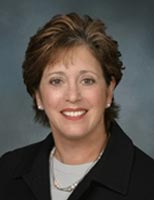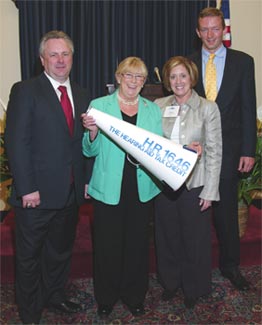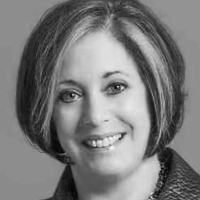Interview with Carole Rogin and Andy Bopp of Hearing Industries Association

Carolyn Smaka: Today I'm speaking today with Carole Rogin and Andy Bopp from Hearing Industries Association (HIA) (www.hearing.org). Carole and Andy, thanks for joining me today.
Carole Rogin
Carole Rogin: We're delighted, thank you.
Andy Bopp
Andy Bopp: Thank you.
Smaka: I wanted to ask you both to tell us about your backgrounds and what your roles are at HIA.
Bopp: Currently I'm the Director of Government Relations with HIA, and I've been with HIA now for six years. My primary focus has been working on the hearing aid tax credit (www.hearingaidtaxcredit.org), which involves working with Congress and congressional staff, as well as working with all the allied groups to coordinate this effort. There is no way that HIA - or any of our groups in the hearing health industry - could do this alone. Working as a coalition, has been our focus. Before coming to HIA, I was with a manufacturing association in the glass industry, working various congressional campaigns in that field.
Smaka: Carole, how about you?
Rogin: By training I'm a speech-language pathologist (SLP). I worked as an SLP for five years and then joined the staff at the American Speech-Language Hearing Association (ASHA). I joined HIA as its first Director of Market Development in 1980. Since that time I have served as not only the Director of Market Development, but also as the President and Executive Director of the Association. My role has been working to bring the industry together to strengthen the ties between the manufacturers and the dispensing and consumer communities. The work that Andy is doing in conjunction with all of our allies is really a testament to what we can do together as an industry. It's very, very gratifying.
Jerry Ruzicka, President of Starkey Laboratories, Rep. Carolyn McCarthy, Carole Rogin of HIA and Andy Bopp of HIA at Hearing on the Hill
Smaka: We're here today to talk about Hearing on the Hill that took place on May 12 - 13, 2009 and was sponsored by HIA. What is the history of this event?
Rogin: This was actually the sixth bi-annual Hearing on the Hill. HIA created this program to re-introduce hearing healthcare issues to each new 2-year session of Congress. The event from the outset has had at least two key parts. First and foremost, we have a series of meetings with legislators in both the House and in the Senate and the CEOs and senior executives from the HIA member firms, which are the hearing aid manufacturers, components manufacturers, and battery manufacturers. The other component of the event has been an afternoon hearing screening event for congressional staff. We bring hearing booths into the Capitol or the Senate or House office buildings. We have local hearing care professionals in Washington D.C. donate their time, and we screen the hearing of members of Congress and legislative staffers. It's a nice way to showcase our expertise and capabilities as a profession. During the hearing screenings, we encourage people to come down and talk with us once again and, more importantly, we give our co-sponsors Representative Carolyn McCarthy (D-NY) and Representative Vern Ehlers (R-MI) a chance to talk to the hearing aid company CEOs.
We finish the day with a reception. From time to time we have added other components to our agenda, but those are the three main activities of our event in May at the start of each new session of Congress, which incidentally also occurs during Better Hearing and Speech Month.
Bopp: The main topic for the congressional meetings this year, of course, is the Hearing Aid Tax Credit. This year our members attended 81 meetings, which is a very aggressive schedule.
Actually 21 of our HIA member executives made these visits in panels. Because of the thousands of contacts from various audiologists' patients and associated people, most offices and staff were already aware of the bill, which was great. Through the years, with all of the various efforts, including Hearing on the Hill, the knowledge that the Hearing Aid Tax Credit is critically needed has really spread.
Smaka: With 81 meetings, how did you have time for hearing screenings?
Rogin: Dr. Therese Walden from Walter Reed Army Medical Center and Chris Gustafson, who is the current President of the International Hearing Society, performed the screenings for us this year. They performed the hearing screenings and gave people the results to take with them, whether or not they passed or failed the screening. It's an easy, casual, and informative way to talk to people about hearing loss and the treatment for hearing loss, which as you know, is most often hearing aids.
Bopp: Of those people who come in, a fair number think they may have some type of hearing loss. We're not getting random people who would have no reason to think that they have a problem. Even though in general congressional staff tends to be younger than Senators, you still have congressional staff that either have hearing aids now or think they may need them. The hearing screening is an easy, quick opportunity to provide a service and some hearing education for them.
Smaka: It seems like a great way to raise awareness as I would think people would be more receptive and understanding of who we are and what we do after having gone through a quick screening.
Bopp: Absolutely.
Smaka: What types of events are available for consumers who may want to help raise awareness of hearing loss, and who have personal stories to share?
Rogin: We've had some ancillary activities from time to time. For instance, we had a luncheon that honored the Congressional Hearing Caucus. We brought in some children with hearing loss from local school systems and their families to recite the Pledge of Allegiance and showcase what amplification does for children with hearing loss.
Generally, however, the Hearing on the Hill activity focuses on Congress. We do include all of the allied organizations in the hearing health field. We also have colleagues from the National Institute on Deafness and other Communication Disorders, the Veteran's Administration, Hearing Loss Association of America, the AG Bell Association and some other agencies who join us as well. The event is not open to the general public.
Bopp: Carolyn McCarthy and Vern Ehlers, who are the lead sponsors of the House bill, are talking to our members and our allies, explaining where we are in the process, and providing a kind of pep-talk. They're also talking to other congressional staff that are in the audience. I think we had 40 congressional staffers who attended at one time or another. It's a way to quickly present the bill to those who might be directly involved.
Smaka: What are the next steps for the Hearing Aid Tax Credit bill? I am not familiar with the legislative process.
Bopp: Well, the legislation HR1646 was reintroduced in the House of Representatives by Carolyn McCarthy and Vern Ehlers. Carolyn McCarthy is the Democrat;Vern Ehlers is the Republican. It's already attracted 70 co-sponsors in two months, which is a very, very large number. In the previous two congresses by the end of two years it had attracted 112. These things build momentum- they never take just one or two congresses.
It's really building to a point where it has attracted the attention of some very significant people. Of that list of 70, there are now 12 co-sponsors on the House Ways and Means Committee. The committee of jurisdiction, which is Ways and Means, is where different tax items will be attached to overall healthcare legislation, which will be considered by multiple committees in the House. So, if you're not familiar with the legislative process you might think, okay, here's the day where we're going to debate Hearing Aid Tax Credit on the floor.
I can guarantee you that will never happen. This is the type of bill that is large by any normal consideration. It's about a 300 million dollar a year bill. However, in the scope of major, major, tax reform or major healthcare legislation, it is small. The timing of this is just perfect. We've been working on this bill for a number of years now, letting it build momentum in and of itself. But what's still needed is a large vehicle such as healthcare reform, which is likely going to happen this year, or certainly before the end of this Congress.
There's also a major tax reform that will come guaranteed with this. If there is no major tax bill, there are multiple tax-type steps to go into effect when the Bush tax cuts expire. So, there must be tax reform, and there likely will be healthcare reform. This bill would be attached to it, along with many, many other tax provisions. We are hoping that among our 12 Ways and Means co-sponsors, our committee champions will say, "We want to get this done." Of those 12, nine are Democrats and three are Republicans, which in the House is a very good proportion since the Democrats control the House. There are some very senior members of that committee who are very supportive and original co-sponsors of the bill. That includes Chris Van Hollen from Maryland, who's been a co-sponsor from the beginning;also, congressmen like John Lewis. There is a full list at www.hearingaidtaxcredit.org.
In terms of the process, once the bill passes the House, then it's in the House legislations. The Senate also would also have to pass some type of bill. You want a bill in both sides. Originally, the House bill covers people 55 years and over and dependants, which is basically children. In the Senate, Tom Harkin from Iowa just introduced legislation. The Senate bill he has opened up is to cover all ages. They're in the process now of getting co-sponsors for their bill. Several have already signed on, and that that will start to build momentum as well.
What we hope would happen is that the tax credit would be attached to one of those two types of legislation, large pieces of legislation that are moving in the rest of this Congress, in both Houses. Then when the overall bill goes to conference committee - that's where the House and Senate bills come together - members of the conference committee determine what parts of which bill are included and what parts are not. Let's say both chambers passed the bill;at that point you can't have one bill that includes all ages and another one that's only 55 years and over plus dependants. At that point it would be decided which version would pass and things can even be totally dropped at that point. So from this stage, we're not necessarily home free, but if we have something rolling in both chambers we're probably in good shape.
At this point, what usually comes out of chambers is almost automatically signed by the President because he has generally been involved from the start. So your key moments are: 1) getting included in the House bill;2) getting included in the Senate bill;3) going through a conference;and lastly, coming out of conference in a form you like. That's how you get a bill.
Smaka: Carole told me that summer is an important time to keep this out in the forefront of professionals. Why is summer "key"?
Rogin: The House, last week in the middle of Hearing on the Hill, made a commitment to passing a healthcare reform bill by the end of July.
So the next two months are absolutely crucial. I also want to reinforce what Andy just outlined for us, in terms of the importance of being in a bill in both Houses. We will increase the chances of our bill being passed as part of a larger healthcare or tax bill if every member of Congress, and especially members of Ways and Means and Senate Finance committees, continue to hear from everyone in the United States who cares about hearing health.
Smaka: What can everyone who cares about hearing health do?
Rogin: We urge everyone to keep communicating. Every HIA member is getting their employees and their employees' extended families involved, and they're going to be engaging their customer base as well. Every hearing care professional should contact his or her elected officials. Andy mentioned the place to go: www.hearingaidtaxcredit.org, . All you have to do is go to that Web site, put in your zip code, and with one click you send letters to your legislators. Or, you can quickly and easily personalize your letters and send them. There are wonderful ideas on the Better Hearing Insitute's Web site, www.betterhearing.org for hearing care professionals to incorporate support for this legislation in their practices, and how to engage their patients as well. The ideas are under "Hearing Healthcare Professionals" and "Local Public Relations Tools". Here professionals will find a download of the logo for the Hearing Aid Tax Credit for professionals' Web sites, examples of postcards and mailings professionals can do to get both their name and the Tax Credit in front of their patients, a suggested op-ed piece for their local newspaper and other practical public relations tools.
Bopp: We also sponsor congressional events for HLAA and AG Bell Chapters.
With support from these groups, one professional can easily bring 75 to 100 people to a breakfast. You know, one professional in Midland, Michigan accounted for half of the 130 people who came out to see Rep. Dave Camp (R-MI), just by inviting his patients and friends. Professionals just have to get the word out either via sending an e-mail to patients or a postcard. If you invite one person and they invite their family, and so on, it mushrooms. We believe that the key to getting the word out about the Hearing Aid Tax Credit is through hearing health professionals and their patients. That includes contacting Congressmen. The contacts from the person who has hearing loss or the parent of a child with hearing loss is very compelling because they are saying, "This affects me. I'm having a tough time paying for this."
There are several professionals who have taken this to a new level to involve their patients and local Congressmen. One audiologist created a group on Facebook. It's important to help speed along the process by getting the word out. These things take time. I've seen other tax credits for much smaller costs to the government take 10 to 12 years. These are not the types of things that happen in just a few sessions. It's major tax legislation that will eventually be on everyone's 1040, and will affect anyone who fills out their taxes. This isn't something that is done lightly or because one powerful Congressman thinks it's a good idea and gets it slipped in. Persistence is the name of the game. You keep knocking on the door and pretty soon you hope someone will answer. This is something that we've built momentum for, and now everything has to come together just right to get this done. It is a real issue. The key word, again, is persistence.
Smaka: That's the same sentiment I heard from Jeanine Gleba, who fought to get legislation passed in NJ for an insurance mandate for partial hearing aid coverage for children called Grace's Law. Her daughter now is nine;she originally started her legislation process when her daughter was a baby.
Rogin: Yes. She did a wonderful job in NJ. The industry salutes her.
Bopp: I'd also like to mention that we're working now to schedule events for Congressmen potentially in Hartford, Connecticut, and Western Wisconsin in the near future. People who are interested in participating in these events, or hosting an event in their area, can contact me at
[email protected]
Smaka: Carole and Andy, thanks for your tireless efforts on behalf of this legislation that will eventually benefit all of us who care about hearing care. It was a pleasure speaking with you both.
Rogin: Thank you, Carolyn.
Bopp: Thank you.
More information on the Hearing Aid Tax Credit can be found at www.hearingaidtaxcredit.org.
More information about how professionals can help spread the word about the Hearing Aid Tax Credit can be found at https://betterhearing.org/professionals/tools.cfm


